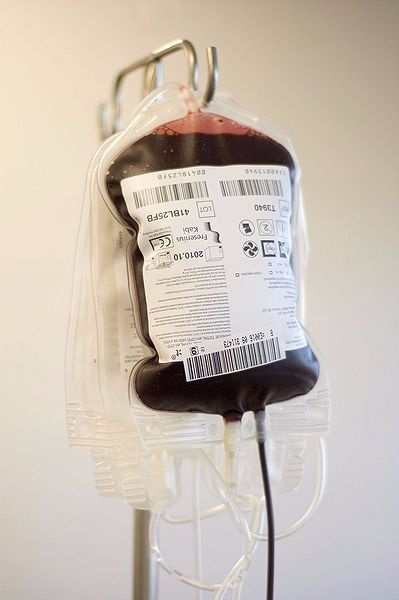Young people are at a ten year low of giving blood. And that really made me think – I’m a young person and I have to admit I’ve never given blood. Why not? I’m not too sure really, it’s just one of those things I’ve always intended to do but have never got around to. Only 14% of regular donors are under 30, so it’s just not me. I thought I’d try and find out why.
A quick poll of my friends found that very few had ever given blood but none were against the idea. As a group of third year university students, most of us have been eligible for around four years now. That’s quite a long time to not get around to something.
My housemate Sami Colenutt told me: “I’ve given blood once. I was recruited at school and a couple of my friends also donated. I’ve been meaning to go again but I just keep forgetting.” After our chat Sami called the helpline and booked her next appointment, so maybe being reminded to donate was all she needed.
Lack of time, fear of needles and not understanding what’s involved are all given as reasons for young people not donating, according to a survey from NHS Blood and Transplant (NHSBT), the blood service for England and North Wales.
Meanwhile a spokesperson for the Scottish National Blood Transfusion Service (SNBTS) says: “It is becoming harder to recruit younger blood donors as the UK now faces an aging population. This means more people are now reaching an age where they may need blood (baby boomers), yet there are fewer 17-year-olds around to start giving blood.”
Numbers of young donors are set to drop even further, as from last month regulations were changed to stipulate that women aged 20 and under must weigh at least 10st 3lbs to qualify. The changes were made bythe Advisory Committee on Blood Tissues and Organs (SABTO), the body who regulate NHSBT, SNBT and the Welsh Blood Service, in response to young women being at higher risk of fainting due to their lower blood volume.
A problem with this system is that a woman aged 17, 18 or 19 – who has previously given blood without problems – will be prevented from donating again at her next scheduled appointment. This will not encourage donor loyalty.
There is currently no data predicting what impact this will have on the donor base and the blood service is being forced to review the way they recruit young donors. Running a donor drive in a school, college or university will obviously be less successful if a large number of female donors are no longer eligible.
So why is it so important for young people to be blood donors?
Jonathon Sewell, NHSBT’s lead donor relations manager for the South West, says: “Quite simply young people are the blood donors of the future. It may sound like a bit of a corny marketing phrase but it does allow us to say to people ‘if you don’t donate there won’t be a blood supply’.
“It is about looking at the future and building resilience in the donor base by making people of the younger generation – say 17 through to 21 – realise that we need them for their entire donation career.”
Of course young people can come up with a million excuses not to do something, but what will motivate them to give blood in the first place?
Dr George Fieldman, chartered psychologist and cognitive behavioral therapist, explains that giving blood relies on something called altruism.
“There are two sorts of altruism; kin altruism and reciprocal altruism. Kin altruism is where you give resources to people to whom you are closely related, typically your children, and you don’t expect to get anything back. But this is closer to reciprocal altruism as you may expect to get something back.
“In the case of giving blood you get something back in two ways – you get a little bit of prestige for being a blood donor, and you get back blood when you yourself have an accident, have an operation or are in need of it.”
He describes donation as a “pro-community” act, as blood is very often given to those within the same region as the donor.
“It could be that young people don’t recognise their dependency and involvement potential with their local community that more middle aged people would. I think young people are just as dependent on their community, they may just not recognise it as much.”
When people take from their local community without giving back, this is known as parasitism. Of course the recipients of transfusions cannot be accused of being parasites; for one people who have received a transfusion since 1980 are automatically ineligible for donation. But it is those who are eligible – such as myself – who expect the blood stock to be there for them in their time of need.
How can young, eligible donors be motivated to get giving?
Dr Fieldman suggests that young people can be educated in schools, which is an approach the blood service is already taking.
By encouraging large groups of young people to donate it may inspire a sheep-like approach which he calls a “snowball effect” – when one person in a group gives blood their status is elevated and this inspires other people to follow suit. Young people are “very probably” more influenced by their peers than middle aged people.
Personally I have never received information on blood donation at any stage of my education, it isn’t something that I have ever discussed with my friends and I don’t know anyone who is a regular donor. I do believe if I had a friend who was vocal about donation I would have been influenced to book my first appointment by now.
This works the same way with using blood donating celebrities in campaigns as role models. This is beneficial in two ways; not only are people likely to be influenced by a celebrity but journalists are more likely to publish articles involving well known personalities.
The use of role models got me thinking: as children people often look up to their parents, so could having blood donating parents make you more likely to donate?
Dr Fieldman said: “Children are powerfully influenced by their parents. Of course some children will rebel against their parents but they will also follow them in different ways. I think children will often – covertly, sometimes – follow their parents in being donors.”
Orin Lewis founded the charity ACLT (African Caribbean Leukemia Trust) fourteen years ago with his wife Beverly after their son Daniel DeGale was diagnosed with Leukemia.
Daniel required a bone marrow transplant but was given a one in 250,000 chance of finding a match because of his ethnic background. Being of African decent, a match is more difficult to find because marrow tissue is more complex and cultural reasons meant there were less potential people on the register who could provide a racial match.
Sadly Daniel died in 2008, but his parents have continued their work to recruit blood and bone marrow donors of all backgrounds. Their latest campaign focuses on recruiting young people.
“You need to keep replenishing the numbers of people registering and giving blood as a lot of current donors won’t be able to step forward because they will pass away through ill health and death,” says Orin. “If you can get someone starting their journey as a blood donor from 17 you can keep them on the register right up to 65.”
“It is a case of just keeping the stocks replenished with – forgive the pun – younger blood.”
The ACLT is constantly looking at ways to improve their campaigns and are currently running donor drives in schools, colleges and universities and reaching out to young people through Facebook and Twitter. However they are looking to diversify their campaigns to target young people at sport and music events.
But why is it necessary for a charity to recruit donors on behalf of the NHS?
“The only reason the ACLT exists is because the medical establishment – which is the NHS, NHS Blood and Transplant or the leading charity on bone marrow donation theAnthony Nolan Trust – have failed to engage.
“All these bodies do a fantastic job. But historically when it comes to communicating and recruiting donors from ethic minorities – regardless of whether it’s bone marrow, blood or organ donation – they’ve failed.
“Somebody needs to bring the two parties together because lives are at stake.”
It can be suggested that the blood service has also failed to engage young people and perhaps a third party organisation is required to bridge the same gaps between young donors and the blood service.
This year having a large active donor base is even more important as NHSBT has already predicted a drop in donations because of the Olympics and bank holiday weekends, and the expected fall in young female donors is set to have an unknown impact. They have began a reminder campaign to ensure that donors keep their appointments.
The blood service have reassured me that the UK has one of the safest and most reliable blood banks in the world, with no need at present to import blood from overseas. Blood stock levels are measured using forward forecasting and historic data which allows for action to be taken before blood levels drop. Members of the public can view the stock levels in their area online.
I have now registered online to give blood and have booked my first appointment. I hope I can encourage my eligible friends to do the same.



